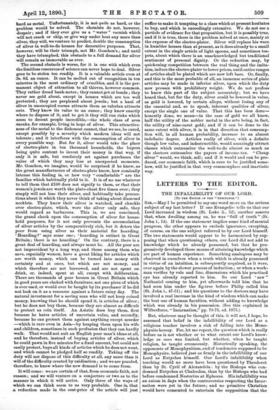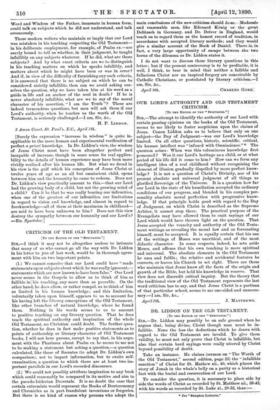LETTERS TO THE EDITOR.
THE INFALLIBILITY OF OUR LORD.
[TO TEE EDITOS OF THE " SpacraTort."]
SIR,—May I be permitted to say one word more on the serious subject of my last letter? If one Evangelist tells us that our
Lord increased in wisdom (St. Luke ii., 52), another asserts that, when dwelling among us, he was "full of truth" (St. Jolu-,t i., 14). If the one statement implies some kind of mental progress, the other appears to exclude ignorance, excepting, of course, on the one subject referred to by our Lord himself. The two statements would appear to be harmonised by sup- posing that when questioning others, our Lord did not add to knowledge which he already possessed, but that he pro- gressively developed those means of attaining knowledge which are part of human experience. Something analogous may be observed in ourselves when a truth which is already possessed in virtue of an intuition, is subsequently acquired, as it were, over again by the slower process of induction ; or when a work- man verifies by rule and line, dimensions which his practised eye has already reported to him. So our Lord 'saw" Nathaniel coming to him, yet afterwards told him that he had seen him under the fig-tree before Philip called him (St. John i., 47-51) ; and his questions to the doctors may have involved a real increase in the kind of wisdom which can make the best use of human faculties, without adding to knowledge which was already in his possession. (See this explained in Wilberforce, "Incarnation," pp. 70-71, ed. 1875.)
But, whatever may be thought of this, it will not, I hope, be assumed that belief in the infallibility of our Lord as a religious teacher involves a risk of falling into the Mono- physite heresy. For, let me repeat, the question which is really before us is not whether or to what extent our Lord's know- ledge as .man was limited, but whether, when he taught religion, he taught erroneously. Historically speaking, the opponents of Monophysitism, and of tendencies supposed to be Monophysite, believed just as firmly in the infallibility of our Lord as Eutyches himself. Our Lord's infallibility when teaching would no more have been questioned by Theodoret than by St. Cyril of Alexandria : by the Bishops who con- demned Eutyches at Chalcedon, than by the Bishops who had before condemned Nestorius at Ephesus. His infallibility was an axiom in days when the controversies respecting the Incar- nation were yet in the future; and no primitive Christian would have consented to entertain the supposition that the
Word and Wisdom of the Father, incarnate in human form, could talk on subjects which he did not understand, and talk erroneously.
Those modern writers who maintain or imply that our Lord was mistaken in his teaching respecting the Old Testament— in his deliberate employment, for example, of Psalm cx.—are surely bound to tell us whether, in their judgment, he taught infallibly on any subjects whatever. If he did, what are those subjects ? And by what exact criteria are we to distinguish in his teaching matters on which he speaks infallibly, and matters about which he might have been or was in error ? And if, in view of the difficulty of furnishing any such criteria, it is answered that there is no subject on which he can be considered strictly infallible, then can we avoid asking our- selves the question, why we have taken him at his word as a guide in life and an anchor of the soul in death ? If he is never absolutely infallible, what are we to say of the moral character of his assertion, "I am the Truth "? These are indeed tremendous questions, but men will ask them if our Lord's authority, when he teaches us the worth of the Old Testament, is seriously challenged.—I am, Sir, &c., 3 Amen Court, St. Paul's, .E.C., April 7th. H. P. LIDDON.
[Surely the expression "increase in wisdom" is quite in- applicable to the mere human and experimental verification of perfect a priori knowledge. In Dr. Liddon's view, the wisdom of Jesus Christ must have been altogether perfect and incapable of increase, though in some sense its real applica- bility to the details of human experience may have been more vividly realised after his human life. But what we dread in his view is the gulf which his conception of Jesus Christ at twelve years of age as an all but omniscient child, opens between him and the humanity he came to redeem. Does not Dr. Liddon's view practically amount to this,—that our Lord had the growing body of a child, but not the growing mind of a child ? Can it be that be was really bearing our infirmities, when one of the greatest of our infirmities, our limitations in regard to vision and knowledge, and almost in regard to foreknowledge—all of them at their maximum in childhood— are said to have been unknown to him ? Does not this view destroy the sympathy between our humanity and our Lord's ? —En. Spectator.]



































 Previous page
Previous page